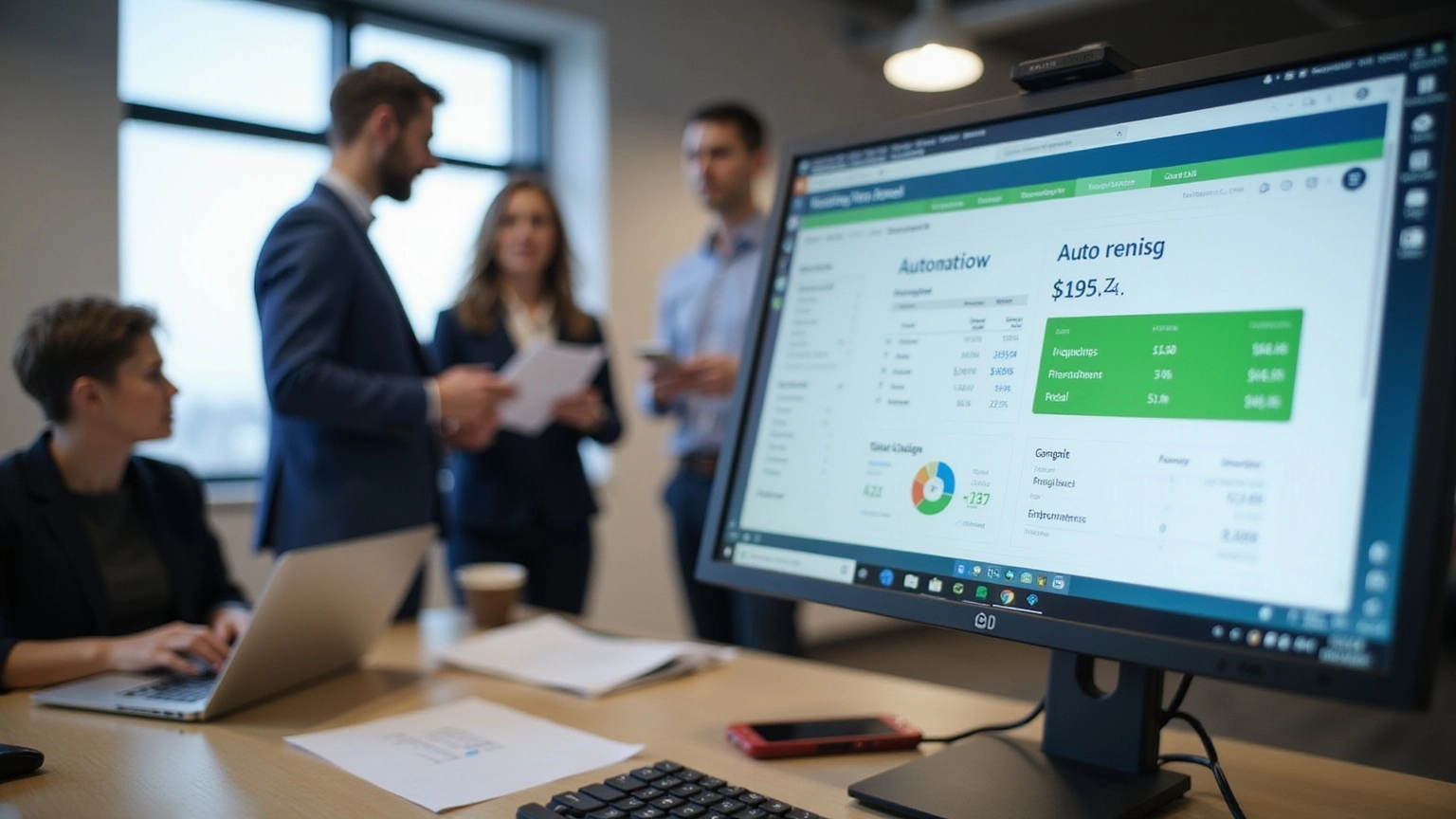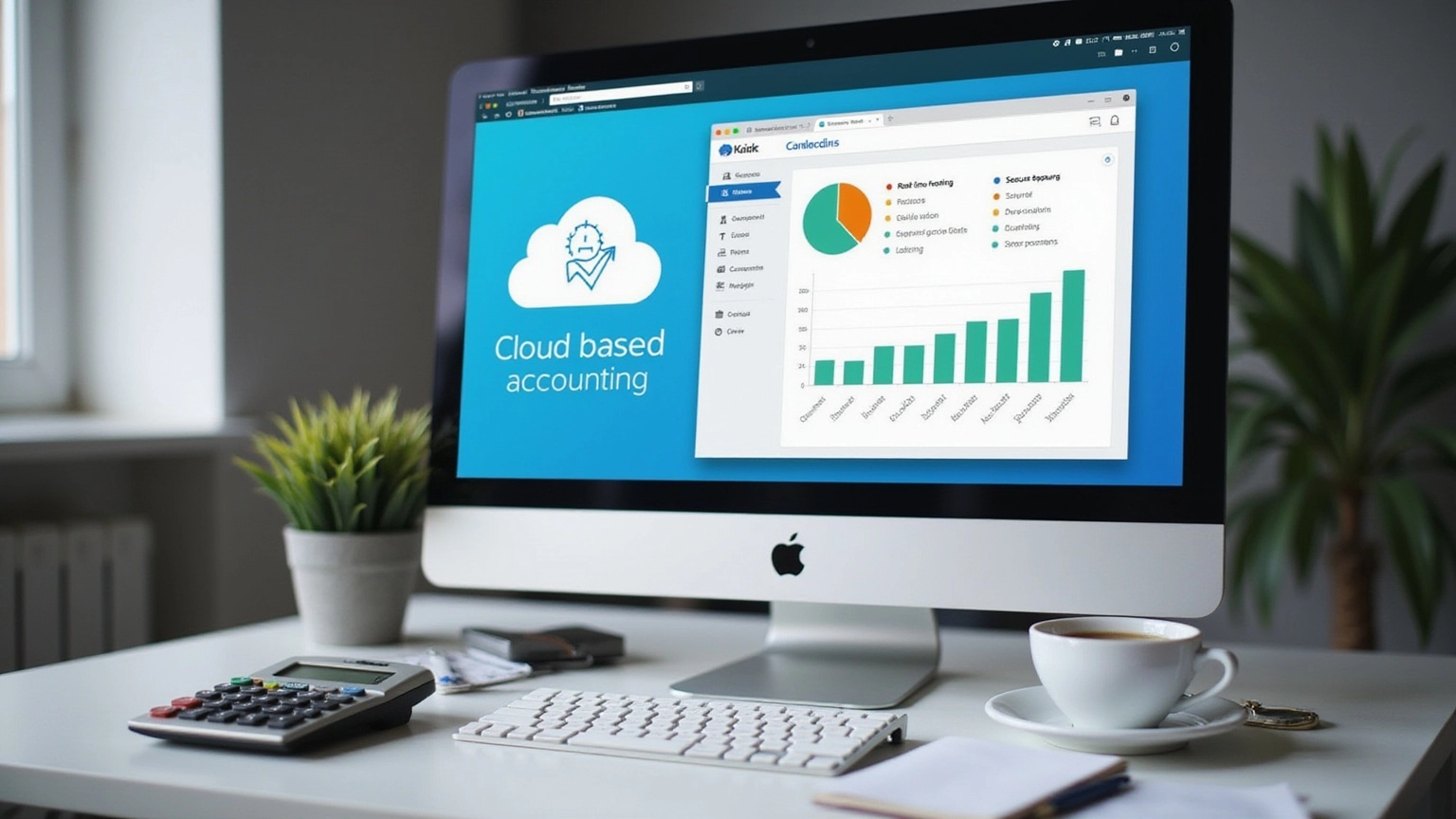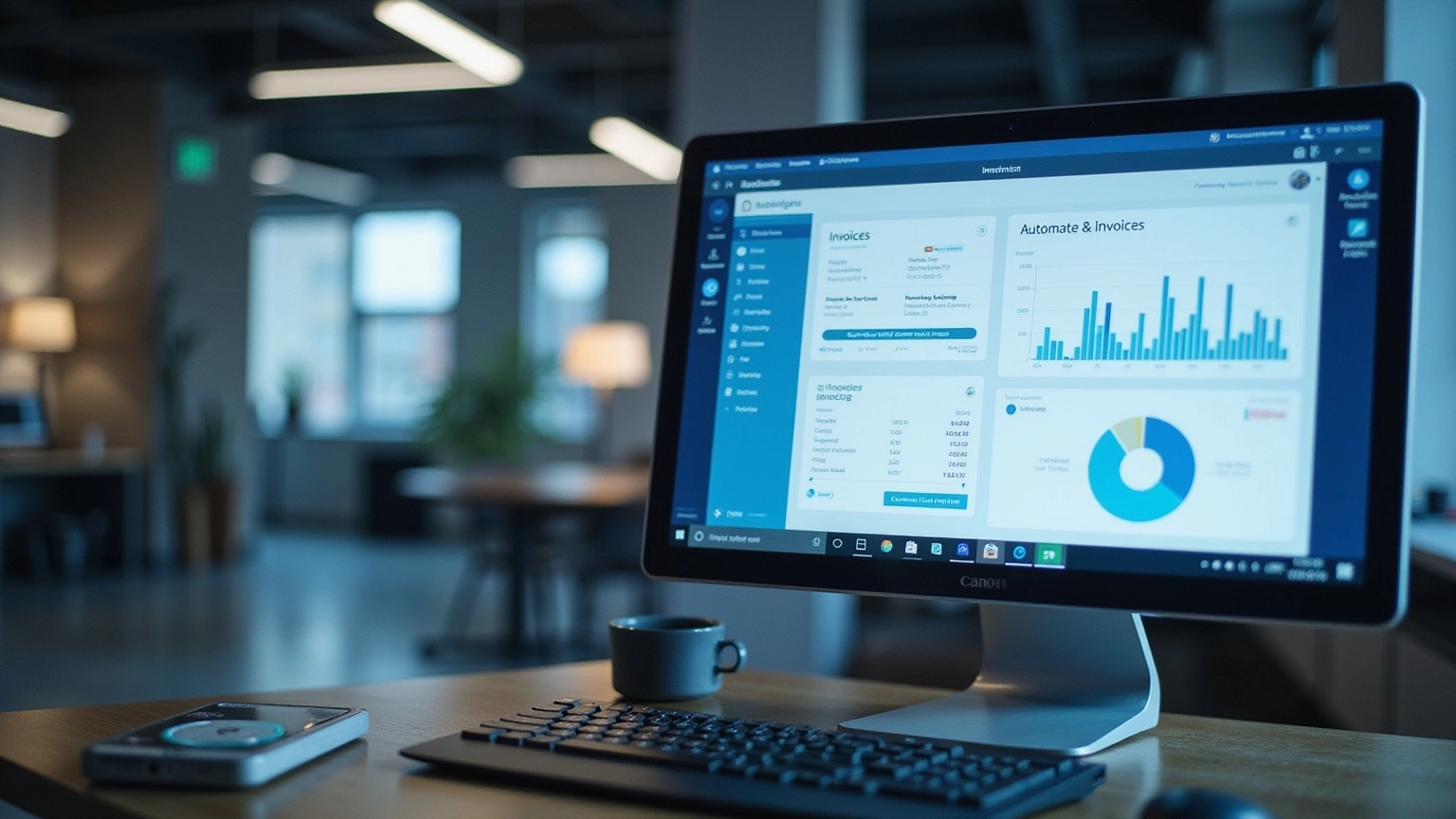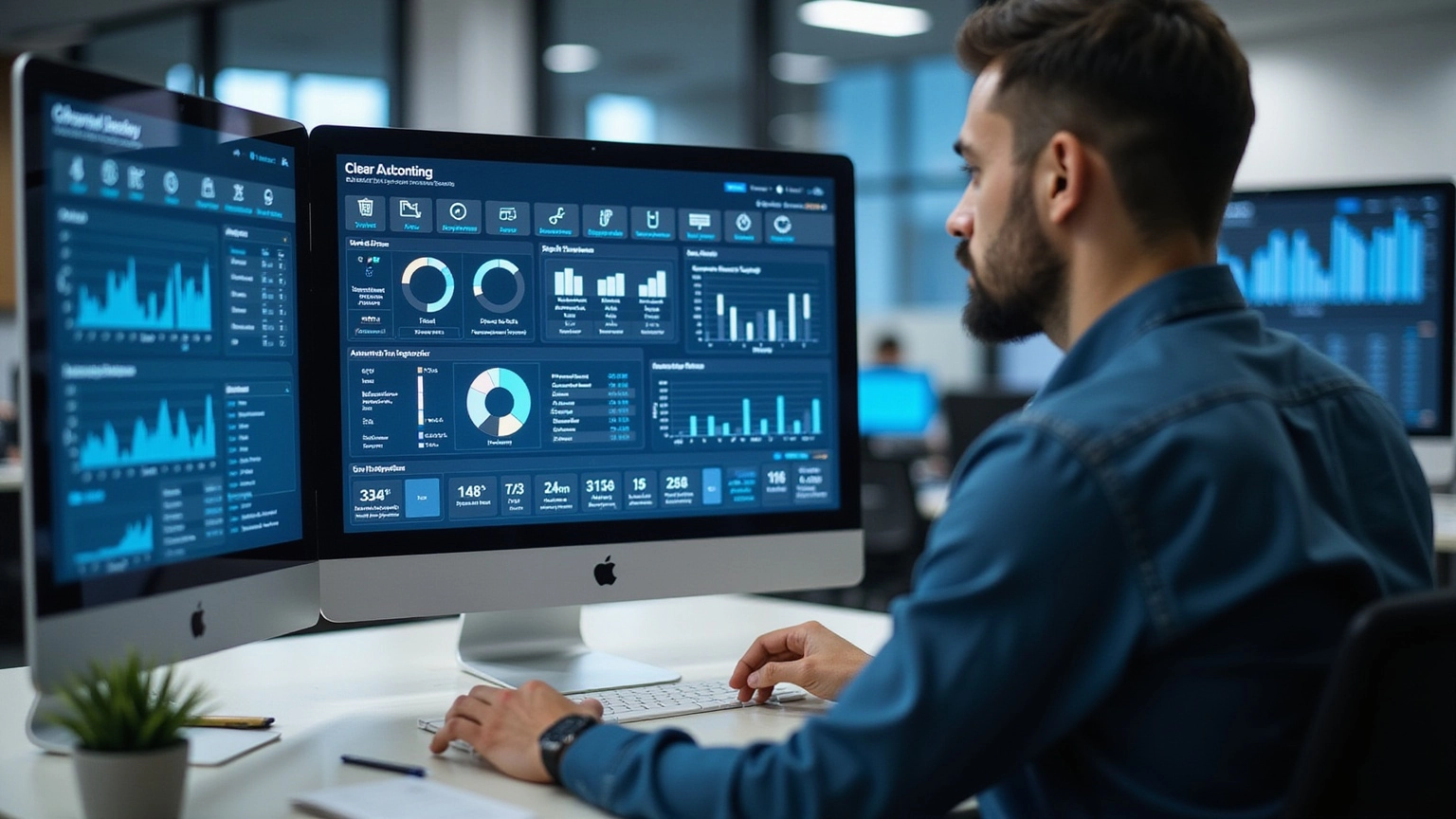Overview
The article presents a compelling overview of the essential accounting tools that every accountant should leverage, underscoring their critical role in automating tasks, enhancing efficiency, and facilitating strategic decision-making.
It begins by addressing the current challenges faced by accounting professionals, then delves into how these tools, with features such as:
- cloud accessibility
- automated invoicing
- robust reporting
effectively meet those challenges. Evidence of increased productivity and improved client interactions from organizations utilizing these tools further supports their necessity in modern accounting practices. This discussion not only highlights the transformative potential of these tools but also prompts accountants to consider their adoption for greater success.
Key Highlights:
- By 2025, accounting tools are crucial for automating tasks and providing real-time financial insights, enabling accountants to focus on strategic decision-making.
- Glasscubes has led to a 40% increase in customer response rates and a 50% reduction in response times for companies using it.
- Key features for accounting software include cloud accessibility, automated invoicing, robust reporting, and user-friendly interfaces.
- The global market for accounting tools is projected to reach $11.8 billion in the next eight years, indicating a growing demand for these resources.
- Automated invoicing tools streamline billing processes, significantly reducing time spent on manual invoicing and improving cash flow management.
- Expense management software enhances tracking and categorization of expenses, leading to better compliance and financial visibility.
- Payroll management systems automate calculations and compliance reporting, minimizing errors and improving employee satisfaction.
- Financial reporting software like Tableau and Microsoft Power BI helps in crafting insightful reports and enhancing stakeholder communication.
- Collaboration tools improve team communication and project management, which is vital for maintaining productivity in accounting.
- Time tracking software increases productivity by providing insights into task allocation and enhancing billing accuracy.
- Emerging technologies like AI and machine learning are set to transform accounting tools, enabling automation of complex processes and deeper financial insights.
Introduction
In the rapidly evolving world of finance, the role of accounting tools has become more critical than ever. As organizations strive for efficiency and accuracy, these tools not only automate mundane tasks but also provide invaluable insights that empower accountants to focus on strategic decision-making.
With advanced software like Glasscubes leading the charge, firms are witnessing remarkable improvements in client engagement and operational efficiency.
By exploring the latest trends in accounting technology—from cloud-based solutions to automated invoicing—this article delves into the transformative power of these tools and their impact on the future of the accounting profession.
Understanding the Importance of Accounting Tools
In 2025, accounting tools have become indispensable for professionals, automating routine tasks, minimizing manual errors, and delivering real-time insights into financial data. These resources empower accountants to shift their focus from administrative duties to strategic decision-making, ultimately enhancing their efficiency in managing customer relationships. The integration of advanced accounting tools, such as Glasscubes, not only streamlines workflows but significantly boosts customer satisfaction.
Companies utilising this platform have reported an impressive 40% increase in customer response rates and a 50% reduction in response times, underscoring the tangible benefits of implementing such tools.
Glasscubes elevates user engagement through its automated communication and information-gathering features, ensuring that responses are organised and readily accessible. This platform enables financial professionals to manage audit requests efficiently, providing real-time insights into pending queries and automated reminders for overdue or missing items. These capabilities conserve time and foster a more responsive and collaborative environment between financial professionals and their clients.
Moreover, Glasscubes is secure, encrypted, and GDPR compliant, offering peace of mind for both firms and clients.
Statistics indicate that 61% of small business owners express satisfaction with their accountant’s advisory services, highlighting a significant opportunity for enhancement through technology. Furthermore, the global market for accounting tools is projected to reach $11.8 billion within the next eight years, reflecting the growing recognition of the importance of these resources in the industry.
Real-world examples further illustrate the impact of accounting tools on efficiency. A case study on descriptive statistics in financial analysis demonstrates how financial professionals can summarise and interpret financial data, leading to informed decision-making and strategic planning. This method not only boosts operational efficiency but also deepens the understanding of a company’s financial health.
As Mark Edmonds, an education professional specialising in statistics, accounting, and auditing, notes, “Thus, statistics is a useful instrument that accounts used to transform raw numbers into a meaningful financial statement involving income statement, cash flow statement, and balance sheet statement.”
Expert opinions reinforce the value of accounting tools, with professionals highlighting their role in converting raw data into meaningful financial statements. As the accounting landscape continues to evolve, adopting sophisticated accounting tools like Glasscubes will be essential for professionals seeking to enhance client satisfaction and streamline their operations.
Key Features to Look for in Accounting Software
When selecting accounting tools, financial professionals must prioritise several key features to ensure optimal efficiency and effectiveness. Cloud accessibility is paramount, allowing users to access financial data anytime, anywhere—an increasingly vital necessity in today’s remote work environment. Automated invoicing and expense tracking capabilities, alongside robust accounting tools, can significantly reduce manual entry errors and save valuable time. Additionally, comprehensive reporting features enable accountants to generate insights quickly and accurately.
Collaboration with other resources is another essential element, as smooth connectivity enhances workflow efficiency and data precision. A user-friendly interface is critical for ensuring that all team members can navigate the software with ease, minimising the learning curve and maximising productivity. Furthermore, strong customer support is crucial; having reliable assistance can make a significant difference in resolving issues swiftly and maintaining seamless operations.
Statistics indicate that the global market for accounting software is projected to reach £11.8 billion within the next eight years, underscoring the growing demand for effective financial management resources. Case studies, such as that of AFH Wealth Management, illustrate the tangible benefits of adopting advanced accounting software. After transitioning from Sage to Access Financials, the firm experienced a turnover increase from £50-60 million to £80-90 million without the need for additional resources, showcasing how features like automated invoicing and integration can support substantial business growth.
By 2025, financial professionals will increasingly seek software that not only meets these functional requirements but also aligns with their strategic goals. As Julian Coyne, Financial Controller at BPA, articulates, “There are really two main benefits with Access Financials – control and efficiency. It has improved our business processes and allowed us to operate much faster.”
Understanding the most sought-after features—such as improved automation, real-time collaboration resources, and comprehensive analytics—will be crucial for accountants utilising accounting tools to remain competitive in the market. Additionally, with the expectation that by 2026, 80% of finance departments will integrate in-house generative AI platforms, the significance of cloud accessibility and advanced features in accounting tools cannot be overstated.
Moreover, these tools are revolutionising customer interaction in accounting by enhancing communication and simplifying information collection. With features like automated reminders and real-time progress monitoring, the platform reduces response times by 50% and boosts customer engagement by 40%. Its secure, user-friendly interface overcomes common email challenges, ensuring that all correspondence is centralised and easily accessible.
The seamless onboarding process, which requires no training and provides tailored setup support, further enhances its appeal for accounting firms aiming to streamline workflows and improve customer engagement. In comparison to other user platforms, this service consistently garners high ratings for its user-friendliness and exceptional customer assistance, making it a notable option for financial professionals.

Cloud-Based Accounting Software: Advantages and Options
Cloud-based accounting tools offer a myriad of advantages that are crucial for contemporary accounting practices. Notable benefits encompass real-time data access, automatic updates, and robust security measures. The platform, specifically tailored for UK accountants, exemplifies these advantages by providing a scalable solution that empowers accountants to work remotely and collaborate seamlessly with clients.
This flexibility is increasingly vital; half of surveyed businesses recognise cloud computing as a modern data protection strategy, with many transitioning to the cloud for disaster recovery and workload migration.
The growth of the cloud accounting software market is projected to continue, with expectations of reaching $11.8 billion in the next eight years. This surge reflects the increasing reliance on cloud solutions for effective bookkeeping and business management, underscoring the significance of accounting tools in this evolving landscape. Companies utilising this platform have reported substantial improvements in customer interaction and operational efficiency.
For instance, Steve, an audit manager at MGI, noted that the transition to the new system has resulted in quicker responses from clients and enhanced clarity in the audit process. He observed that clients appreciate having all details consolidated in a single secure workspace, which has facilitated a more efficient information collection process and a marked increase in engagement.
Moreover, Sophie Montgomery from TaxAssist Accountants shared that her firm saved an impressive 288 hours in just one tax season, while also experiencing a 40% increase in customer response rates and a 50% reduction in response times. These outcomes highlight the transformative impact of cloud-based solutions on accounting tools.
In conclusion, the advantages of cloud-based accounting tools are clear: they not only streamline processes but also bolster security and accessibility, making them indispensable for accountants aiming to enhance their client information collection and overall effectiveness. Furthermore, Glasscubes provides features such as automated reminders, secure document sharing, and real-time reporting, which further elevate its value for accounting professionals.

Automated Invoicing Tools: Simplifying Billing Processes
Automated invoicing solutions such as FreshBooks and Invoice Ninja revolutionise the billing process by automatically generating invoices based on predefined criteria. These platforms not only streamline invoice creation but also send reminders for overdue payments, track invoice statuses, and integrate seamlessly with existing accounting tools, enhancing efficient financial management. By harnessing automation, financial professionals can significantly minimise the time spent on billing tasks, enabling them to concentrate on more strategic activities.
In addition to these resources, Glasscubes enhances the invoicing process with its flexible automated reminder feature. Users can send up to 10 reminders on a straightforward schedule or, through advanced options, an unlimited number of reminders tailored to specific frequencies or days of the year. This level of customisation empowers accountants to craft messages that convey urgency for impending deadlines, further optimising client engagement and ensuring timely follow-ups.
Statistics indicate that a single clerk typically requires an average of 12 minutes to manually process an invoice. However, with the implementation of accounts payable (AP) automation, this efficiency can increase dramatically; as Shaun Jex, a Financial Automation Content Specialist, articulates, “Through the power of AP automation, this number jumps to 30 invoices per hour.” This transformation not only boosts productivity but also positively influences cash flow management, as timely invoicing and follow-ups facilitate quicker payments.
Case studies underscore the effectiveness of these resources in practical applications. For example, Stampli, a recognised leader in AP automation, integrates AI to enhance invoice processing and payment management without necessitating substantial changes to existing ERP systems. Its straightforward integration and no-code implementation process enable businesses to witness positive impacts on their invoice processing efficiency within weeks of adoption.
The benefits of utilising accounting tools like automated invoicing systems extend beyond mere time savings. They streamline billing for financial professionals by alleviating the administrative burden associated with manual invoicing, thereby enhancing overall cash flow management. Expert insights emphasise that these accounting tools not only improve operational efficiency but also foster stronger client relationships through timely and accurate billing practices.
By embracing solutions like FreshBooks, Invoice Ninja, and Glasscubes, which offer user-friendly interfaces and robust features tailored for financial professionals, firms can significantly streamline their invoicing processes, ultimately leading to improved financial outcomes.

Expense Management Software: Keeping Track of Costs
Accounting tools, particularly expense management software such as Expensify and Zoho Expense, are essential for accountants striving to efficiently track and categorise expenses. These platforms empower users to seamlessly capture receipts, automate approval workflows, and generate comprehensive reports for in-depth analysis. By leveraging accounting tools, companies can significantly enhance their understanding of spending trends, identify potential cost-saving opportunities, and ensure compliance with financial regulations.
The benefits of implementing accounting tools for expense management extend well beyond basic monitoring. For instance, organisations utilising Expensify have reported a remarkable 50% reduction in response times for expense approvals, underscoring the effectiveness these tools bring to the accounting process. Similarly, companies that have adopted such systems have experienced an equivalent 50% decrease in response times, highlighting the efficiency of these resources in streamlining workflows and enhancing client interactions.
Glasscubes facilitates this improvement through automated reminders and real-time visibility into audit processes, fostering seamless communication and timely data submission. Moreover, a survey conducted by The Economist Intelligence Unit revealed that 60% of finance executives lack complete visibility into their organisations’ transactions, emphasising the urgent need for robust expense management solutions that deliver real-time insights into spending data. Organisations embracing accounting tools have demonstrated improved compliance with financial regulations, as these solutions promote accurate record-keeping and simplify audit procedures. For example, firms employing Zoho Expense have successfully maintained compliance by automating expense reporting, thereby minimising the risk of errors and enhancing accountability.
Notably, Sophie Montgomery from TaxAssist Accountants reported an impressive 288 hours saved in just one tax season through effective expense management, illustrating the tangible benefits these tools provide. As the demand for effective expense management continues to escalate, particularly in regions like North America, which is projected to command the largest market share in 2025, the significance of these tools cannot be overstated. With Asia Pacific expected to achieve the highest growth rate in the expense management software market from 2025 to 2030, financial professionals must proactively integrate these technologies into their practices. Ultimately, the adoption of accounting tools not only enhances financial visibility but also empowers accountants to make informed decisions that drive organisational success.
Payroll Management Tools: Ensuring Compliance and Efficiency
Transform your payroll process with innovative payroll management systems that automate essential tasks like calculations, tax deductions, and compliance reporting. These platforms guarantee accurate and timely payments for employees while generating necessary documentation for tax purposes, significantly alleviating the administrative burden on accountants.
Minimising the risk of errors is crucial, especially considering that 70% of employees who encounter payroll mistakes report decreased job satisfaction. Alarmingly, only 1 in 3 payroll professionals plan to invest in payroll improvements in the upcoming year, underscoring the urgent need for efficient solutions.
The positive impact of automated payroll systems on compliance rates is noteworthy; organisations that adopt these tools often experience enhanced adherence to regulations, thereby reducing the likelihood of costly penalties.
Flexibility in payroll systems is paramount in today’s rapidly changing business landscape, where nearly 38% of organisations are shifting towards hybrid payroll models. This transition indicates a growing demand for versatile payroll solutions that adapt to evolving business requirements.
Moreover, the platform enhances the onboarding experience for accountants by providing an intuitive setup process that requires no training. During a personalised onboarding call, the team gains insights into your group structure and processes, adjusting the portal to meet your specific needs, ensuring effortless navigation of the system. This streamlined approach not only saves time but also fosters improved customer engagement through secure file sharing and automated reminders.
Case studies reveal that firms leveraging resources like Glasscubes achieve significant efficiency gains. By optimising payroll processes and enhancing client communication, these resources save time and elevate overall employee satisfaction, cultivating a more productive work environment. As we look ahead to 2025, leading payroll management solutions for financial professionals will continue to prioritise automation and compliance, empowering firms to navigate the complexities of payroll with ease.
Financial Reporting Software: Generating Insightful Reports
Financial reporting software, featuring robust resources such as Tableau and Microsoft Power BI, empowers finance professionals to craft intricate reports and interactive dashboards that effectively showcase financial data. These applications play a pivotal role in analysing trends, forecasting future performance, and facilitating informed business decisions. By harnessing financial reporting software, finance professionals can present complex data clearly and concisely, significantly enhancing communication with stakeholders.
The advantages of utilising such software extend far beyond mere data presentation. For example, firms employing Tableau have reported enhanced data visualisation capabilities, enabling deeper insights into financial performance. This ability is crucial in today’s fast-paced business environment, where timely and accurate information is essential.
Moreover, Microsoft Power BI offers strong integration with diverse data sources, allowing accountants to seamlessly merge information and obtain actionable insights.
Statistics indicate that organisations leveraging financial reporting solutions experience improved decision-making processes, with 53% of small business owners identifying their accountants as trusted advisors. This trust is often built on the transparency and reliability of the financial insights provided through these advanced reporting resources. Notably, companies utilising this platform have observed a 50% reduction in response times and a 40% increase in customer engagement, underscoring the effectiveness of this tool in enhancing communication and information collection.
Additionally, it offers specialised onboarding support, fostering a more structured process for accounting firms. Unlike traditional email communication, which can lead to misplaced replies and repeated requests, this platform ensures that all correspondence is contained within each audit request. The platform’s automated reminders and real-time progress tracking guarantee that responses are not lost, significantly minimising the time spent on follow-ups.
Furthermore, this platform is secure, encrypted, and GDPR compliant, providing peace of mind for both firms and clients. Case studies reveal that users of this platform have saved an average of 288 hours in a single tax season, highlighting the tangible benefits of utilising it alongside other financial reporting tools.
As we look to 2025, the landscape of financial reporting software continues to evolve, with increasing adoption rates among accounting professionals utilising various accounting tools. As companies strive to harness the potential of data, tools like Tableau and Microsoft Power BI are becoming indispensable for financial professionals seeking to enhance their reporting capabilities and drive strategic business outcomes. Moreover, as Malaysia evolves into a financial hub with over 33,000 registered professionals, the importance of resources like Glasscubes in improving client interactions becomes even more pronounced in the global accounting landscape.
Collaboration Tools: Enhancing Team Communication
Collaboration platforms like Slack and Microsoft Teams are revolutionising communication within accounting groups by enabling real-time conversations and seamless file sharing through advanced accounting tools. These platforms establish a centralised hub for project management and updates, significantly enhancing teamwork. By integrating these collaborative resources into their daily workflows, accountants can streamline processes, minimise misunderstandings, and boost overall productivity.
The impact of these resources on team dynamics is profound. For instance, studies reveal that 97% of employees and employers acknowledge that a lack of collaboration undermines workplace success, highlighting the essential need for effective communication in accounting. Furthermore, expert insights indicate that empowering employees to make decisions through effective collaboration significantly increases the likelihood of success.
This is particularly crucial in accounting tools, where accuracy and timely communication are paramount.
In addition to these tools, the platform offers a unique solution that enhances client interaction through automated messaging and efficient information collection. By providing a centralised platform for all audit-related communication, the system alleviates the challenges associated with lengthy email threads and repeated requests for information. Users have emphasised that the clarity and structure this platform brings to the audit process significantly improve response rates and efficiency in information collection.
Case studies illustrate the tangible benefits of utilising collaboration software. Many enterprises report difficulties in adopting these resources, especially concerning security and technology compatibility. However, 58% of enterprises stress that risk assessment is vital for managing communications, while 64% encounter integration challenges.
Despite these obstacles, the benefits of improved communication and enhanced productivity are irrefutable. Notably, only 20% of leaders in a McKinsey study believed their team was high-performing, underscoring the importance of collaborative resources in boosting team performance. By 2025, the role of collaborative resources in accounting will continue to evolve, with platforms such as Slack, Microsoft Teams, and Glasscubes leading the charge.
These tools not only improve communication but also contribute to a more organised workflow, allowing accounting teams to focus on their core responsibilities with the aid of accounting tools. As companies increasingly recognise the importance of teamwork, the adoption of collaborative resources, including accounting tools, will be essential for maintaining high-performing teams in the accounting sector. Moreover, the CIPD has found that teamwork training and collective goal-setting significantly enhance the success of high-performing teams, further reinforcing the argument for the importance of collaborative resources in achieving team success in accounting.

Time Tracking Software: Maximizing Productivity
Time tracking software, such as Toggl and Harvest, empowers financial professionals to meticulously monitor the time allocated to various tasks and projects. These tools not only provide valuable insights into productivity levels but also help identify specific areas primed for enhancement. By integrating accounting tools like time tracking solutions with Glasscubes, accountants can streamline information collection, elevate customer engagement, and automate workflows, ensuring precise billing and optimising resource allocation.
The impact of efficient time tracking on productivity is profound. For instance, firms employing these tools have reported a notable increase in productivity, with some studies indicating that accurate time tracking can lead to a 25% boost in overall efficiency. This is particularly crucial in the accounting sector, where every minute directly influences customer billing and the utilisation of accounting tools for project management.
Harvest, with a G2 rating of 4.3, exemplifies effectiveness as a time tracking solution, underscoring the significance of accounting tools for accountants. It serves as a cornerstone for informed decision-making, allowing firms to analyse time spent on various tasks and adjust workflows accordingly. This adaptability not only enhances customer satisfaction but also fosters a more organised approach to workload management.
Moreover, efficient time monitoring with tools like Memtime can further elevate productivity and ensure accurate invoicing for completed tasks. The integration of alternative solutions into the workflow can significantly enhance these initiatives. With features such as automated reminders, real-time reporting, and secure file sharing, the platform enables professionals to manage client interactions more effectively.
Additionally, this platform presents various pricing options, including an Essential plan at £120 per month, a Professional plan at £180 per month, and an Advantage plan at £360 per month, offering flexibility to meet diverse business needs. Compliance with ISO27001 and GDPR ensures that data remains secure and aligns with industry standards, which is vital for professionals handling sensitive information.
Case studies illustrate the transformative effects of time tracking software; when paired with Glasscubes, firms can achieve even greater efficiency. For example, Insightful, a robust time tracking and billing solution, provides detailed analytics that can enhance productivity and project management. Although its extensive features may initially overwhelm beginners, the insights gained can lead to significant efficiency improvements over time.
Applications like Toggl and Harvest are particularly effective in enhancing productivity monitoring. They grant financial professionals the ability to link each time entry to specific clients, projects, and tasks, facilitating intelligent reporting that identifies top performers and boosts profitability. By leveraging Glasscubes’ capabilities alongside these resources, companies not only refine their billing precision but also cultivate a culture of responsibility and performance within their teams.
![]()
Emerging Technologies: The Future of Accounting Tools
Emerging technologies such as artificial intelligence (AI), machine learning, and blockchain are set to transform the accounting industry significantly by enhancing the effectiveness of accounting tools. These innovations automate complex processes, bolster data security, and provide deeper insights into financial performance through advanced accounting tools. For instance, AI applications streamline routine tasks, allowing accountants to focus on strategic decision-making rather than administrative duties.
A notable case study, ‘Adopting New Technologies in Accounting,’ illustrates how firms integrating AI and machine learning have reported improved operational efficiency and reduced IT costs, despite initial challenges such as system compatibility and staff training. This case study emphasises the necessity of careful planning and vendor support to mitigate these issues.
Looking toward 2025, the impact of these technologies is expected to expand. Over 50% of accounting executives anticipate that the development of automated and intelligent accounting systems will profoundly influence their businesses in the coming decades, according to ACCA.
This shift underscores the importance of selecting the right AI tools and accounting tools, alongside a commitment to continuous learning for effective implementation. Notably, more than 8,000 practises throughout Australia and New Zealand rely on this platform to enhance their operations, improve user experience, and boost productivity. By embracing these advancements, accounting firms can enhance user experiences and increase productivity through streamlined communication and real-time reporting features offered by Glasscubes.
The platform’s automated reminders and organised information requests significantly decrease response times by as much as 50% and enhance customer engagement by 40%, positioning firms competitively in the market. As the landscape evolves, staying informed about these trends will be crucial for accountants aiming to leverage new tools that enhance efficiency and client service.

Conclusion
The transformative power of accounting tools is unmistakable, showcasing the substantial benefits they provide to firms and professionals within the finance sector. By streamlining routine tasks and enhancing client engagement, these tools—especially advanced solutions like Glasscubes—are fundamentally reshaping the accounting landscape. The automation of processes such as invoicing, expense management, and payroll not only minimises errors but also liberates valuable time for accountants, allowing them to concentrate on strategic decision-making.
As highlighted in the article, the integration of cloud-based solutions and collaboration tools significantly elevates operational efficiency and client satisfaction. Firms that leverage these technologies report impressive improvements in client response rates and overall productivity, driven by features that deliver real-time insights and foster enhanced communication. This shift towards a more tech-driven approach is not merely a trend; it represents a necessary evolution within the accounting profession.
Looking to the future, the ongoing adoption of emerging technologies, including AI and machine learning, promises to further revolutionise the industry. As accountants embrace these innovations, they will be better positioned to navigate complex financial landscapes and provide unparalleled service to their clients. By prioritising the right tools and features, firms can ensure they remain competitive and responsive in a rapidly evolving market. The future of accounting is indeed bright, propelled by technology that empowers professionals to achieve greater efficiency and effectiveness in their roles.
